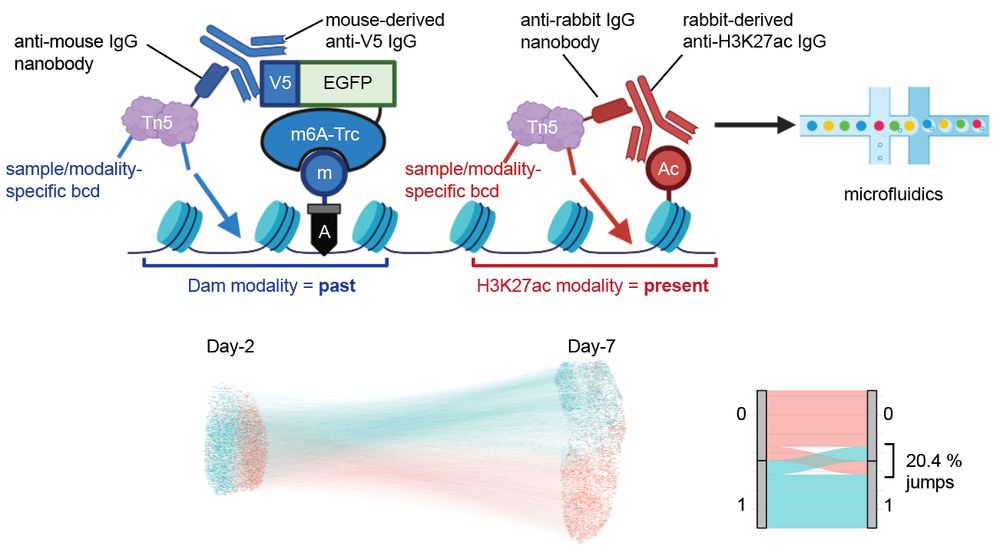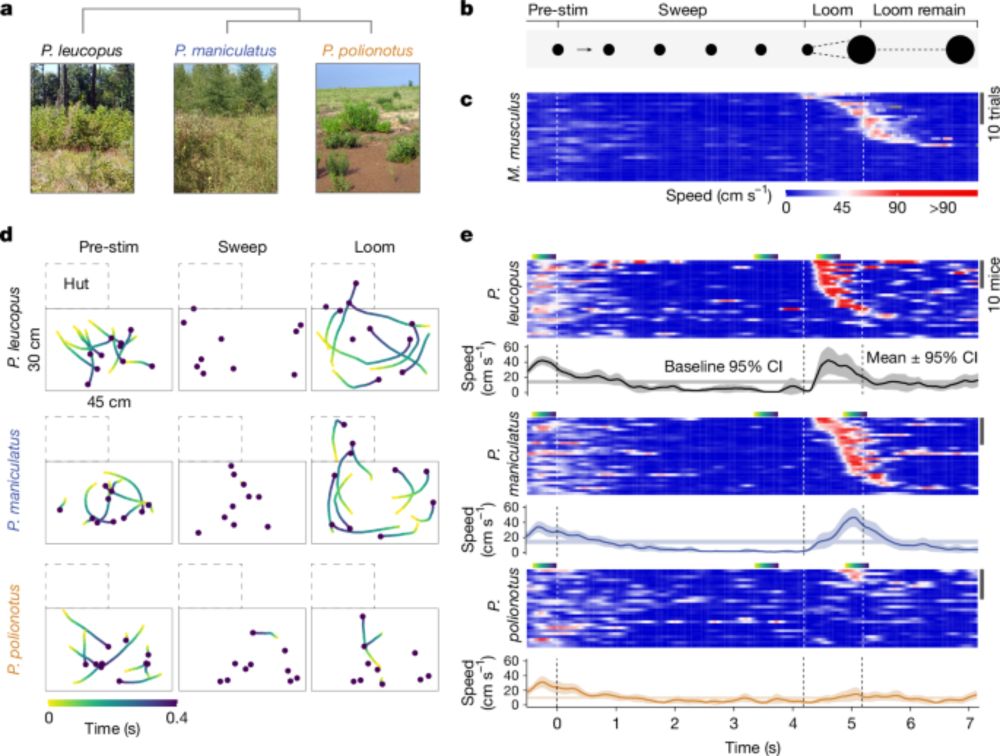
Neuroscience has a species problem
If neuroscience is serious about building general principles of brain function, cross-species dialogue must become a core organizing principle.
If neuroscience is serious about building general principles of brain function, cross-species dialogue must become a core organizing principle rather than an afterthought, writes @suthanalab.bsky.social.
#neuroskyence
www.thetransmitter.org/animal-model...
16.02.2026 20:57 —
👍 88
🔁 32
💬 3
📌 8
1/n. I agree w/ Josh's emphasis on computationally grounded approaches, coordinated x-species work, and skepticism that emotion only encompasses constructed feelings. As he notes, hierarchical frameworks can encompass multiple levels of processing,
27.01.2026 13:48 —
👍 6
🔁 2
💬 2
📌 0
Thanks for weighing in, Alex. I appreciate your perspective here, and the paper you cite is an important piece of this conversation.
28.01.2026 03:32 —
👍 1
🔁 0
💬 1
📌 0
Preaching to the choir, and the composer 😊
26.01.2026 22:39 —
👍 2
🔁 0
💬 0
📌 0
Me too. Couldn't fit it into the current piece, but this is a major advantage of a cross species approach; the ability to probe the circuit and molecular mechanisms of higher order emotion across conserved structures in non-human organisms
26.01.2026 22:33 —
👍 1
🔁 1
💬 1
📌 0
Grateful to @emilysingerneuro.bsky.social for excellent editorial guidance on this piece.
26.01.2026 12:01 —
👍 2
🔁 0
💬 0
📌 0
Thanks, I was inspired by your Transmitter-emotion piece 😊
26.01.2026 12:00 —
👍 2
🔁 0
💬 0
📌 0

Why emotion research is stuck—and how to move it forward
Studying how organisms infer indirect threats and understand changing contexts can establish a common framework that bridges species and levels of analysis.
My perspective in @thetransmitter.bsky.social on why emotion research feels stuck and how we might move forward—by focusing on how the brain uses internal brain models to shape emotional processing across species. www.thetransmitter.org/emotion/why-...
26.01.2026 11:18 —
👍 70
🔁 24
💬 3
📌 2

Dendritic compartment-specific spine formation in layer 5 neurons underlies cortical circuit maturation during adolescence
Mouse models of schizophrenia show defects in adolescent spine formation in a specific dendritic compartment of L5 neurons.
Our new paper is out in Science Advances! We found that dendritic compartment-specific spine “formation” during adolescence is critical for cortical development. We also found that schizophrenia-related genes are important in this process. (1/6)
www.science.org/doi/10.1126/...
15.01.2026 01:42 —
👍 9
🔁 2
💬 1
📌 0

🎉 Great news! IBRO is pleased to introduce the Scientific Program Committee for the IBRO 2027 World Congress, led by Drs. Sheena Josselyn and Thiruma V. Arumugam
🔗 Discover the full committee & read the announcement: https://ow.ly/p37U50XTXqN
09.01.2026 14:32 —
👍 12
🔁 4
💬 2
📌 0
Congrats, Keri, so excited for you! Amazing to see your journey from UCLA to now 🎉
10.01.2026 04:49 —
👍 2
🔁 0
💬 1
📌 0

Body size predicts the selection of defensive behavioral strategies
Survival depends on the ability to respond appropriately to threats, yet the selection of defensive behaviors varies among individuals with distinct b…
New paper from @ykneurores.bsky.social in our lab 📢
We show body size predicts defensive behavioral strategy; smaller animals adopt active avoidance, larger ones favor freezing, while sex and age don’t drive the effect. A clear demonstration that traits matter.
www.sciencedirect.com/science/arti...
24.12.2025 00:31 —
👍 28
🔁 7
💬 1
📌 0
If you're at @sfn.org check out @ykneurores.bsky.social's poster on Tuesday Nov 18th morning!
EE4 - A functional input-output organization in the amygdala for emotional learning and memory
17.11.2025 17:44 —
👍 6
🔁 3
💬 0
📌 0

Next Tuesday!:🧠📷 Join us for the Japan Neuroscience Global Soirée-#SfN2025 Social! 📷7–9 PM 📷 Protector Brewery: San Diego craft beer, food (free while supplies last) & lively discussions! 📷 RSVP (optional): evite.me/pAvuVkpqbK 🍻
16.11.2025 16:26 —
👍 7
🔁 2
💬 0
📌 0

🧠🍺 Join us for the Japan Neuroscience Global Soirée-#SfN2025 Social!
📅 Tue, Nov 18 | 🕖 7–9 PM
📍 Protector Brewery: maps.app.goo.gl/Z4hmQnLSDjwZ...
San Diego craft beer, great food (free while supplies last) & lively discussions!
🔗 RSVP (optional): evite.me/pAvuVkpqbK
All welcome—spread the word! 🍻
05.11.2025 00:30 —
👍 4
🔁 0
💬 0
📌 0
New paper from the lab 🚨
Led by Ali Golbabaei, this study explores the how the composition of prefrontal cortical engrams changes with memory age:
authors.elsevier.com/a/1lzT-3BtfH...
22.10.2025 18:50 —
👍 43
🔁 21
💬 4
📌 0
Congrats Jun!!
15.10.2025 23:08 —
👍 0
🔁 0
💬 0
📌 0

Distinct circuit motifs evaluate opposing innate values of odors
Evaluating the innate value of objects is critical for expressing adaptive behaviors. However, where and how this computation takes place in the brain…
A fascinating paper from Hokto Kazama's lab draws upon the fly connectome and large scale recordings to show how olfactory valence is encoded in distinct neurons in the lateral horn (drosophila amygdala) through labeled lines and biased feedforward inhibition www.sciencedirect.com/science/arti...
08.10.2025 04:25 —
👍 5
🔁 0
💬 0
📌 0
Excited to share that I landed my dream job!🎉🎉🎉 The Pennington Lab will be opening at the University of British Columbia in January 2026!
@ubcpsych.bsky.social @dmcbrainhealth.bsky.social
29.09.2025 16:31 —
👍 157
🔁 29
💬 29
📌 5

Transcriptomic diversity of amygdalar subdivisions across humans and nonhuman primates
Specialized cell types and links to psychiatric disorders are revealed by genetic mapping of primate amygdala neurons.
A spatially resolved transcriptomic atlas of the primate amygdala (human, macaque, and baboon) now out in Science Advances (www.science.org/doi/10.1126/...). The amygdala contains 32 types of neurons with many neuron types specific to particular subdivisions.
Lots of updates from the preprint!
17.09.2025 19:31 —
👍 118
🔁 46
💬 9
📌 3

Excited to share our latest paper - now out in @science.org - we showed how oxytocin modulates maternally-directed behavior in young mice (P15).
12.09.2025 15:21 —
👍 106
🔁 34
💬 4
📌 1

Please RP.
We are thrilled to announce that our lab’s first preprint is out!
”Whole-genome single-cell multimodal history tracing to reveal cell identity transition”
We report HisTrac-seq, a multiomic single-cell molecular recording platform.
www.biorxiv.org/content/10.1...
16.08.2025 07:15 —
👍 78
🔁 41
💬 2
📌 4
Great, the meeting is in good hands!
20.07.2025 01:13 —
👍 4
🔁 0
💬 0
📌 0

Jobs
We are working to solve the biggest mysteries in bioscience.
We have an open position for a Scientist I at the Allen Institute for Neural Dynamics. Come join our exciting research environment @alleninstitute.org. Please share!
alleninstitute.org/careers/jobs...
07.07.2025 23:39 —
👍 41
🔁 25
💬 1
📌 1

















